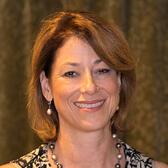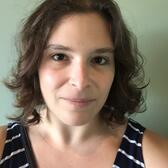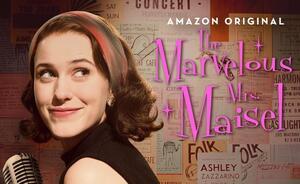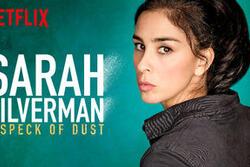A Tale of Two Maisels
Spoilers ahead!
When it comes to the new Amazon original series, The Marvelous Mrs. Maisel, we are an office divided. The newest series from Gilmore Girls showrunner Amy Sherman-Palladino has a whole lot to love, especially if you love history, Jewish women, and feminism (which we do!).
At the same time, this first season pays little homage to the many funny Jewish women that were making waves in comedy before Midge grabbed the mic (Sophie Tucker, Molly Picon, Fanny Brice, hello?) and paints Midge’s Jewish community with a very broad brush. Some in the office, like our Associate Director of Programs and Education, Larisa Klebe, loved the show. Others, like our Director of Marketing and Communications, Rachel King, thought it left much to be desired. We captured their conversation and differing opinions below!
Larisa Klebe: I’m excited to talk to you today about “The Marvelous Mrs. Maisel”! So, what do you think of Midge Maisel as a character?
Rachel King: She’s the one part of the show I like! Midge feels unique, not just because of the particulars of the storyline––a Jewish woman in the 1950s trying to break into comedy––but because she both lives within her prescribed world AND defies it. Rachel Brosnahan really inhabits the character and brings her to life.
LK: In so many ways she’s almost a caricature of a 1950’s housewife, especially at the beginning, but as the show progresses she breaks that mold more and more. You can see this when she starts writing little pieces of jokes on the way home from the club. They’re for Joel, but still, she wrote them!
RK: Her individuality is established in the pilot episode when we see her at her wedding saying: “Who gives a toast at their own wedding? I do!” She is definitely living the typical life of a woman at the time, while showing glimmers that she could, if she wanted, transcend it with her smarts and humor.
LK: Very true! It was wonderful to watch how her priorities change as she begins to seriously pursue this career in comedy. I think the whole storyline about the Rabbi coming over for Yom Kippur dinner is a great example.
RK: For me, that scene was over the top. It was one of the early signs that the show was problematic when it came to portraying Jewish life at the time. I think this show is Amy Sherman Palladino’s chance to finally inhabit a Jewish world (something the WASP-y storyline of Gilmore Girls didn’t allow!), but rather than this feeling like a fond, winky portrait for a Jewish audience, I felt like the show is overly broad and full of cheap shots and stereotypes. I mean … come on: the two fathers are named "Moishe" and "Abe" and are henpecked by their wives. The flashback to Joel’s bar mitzvah is especially awful––we see his father teaching him that it’s the occasion is a chance to be better than everyone else and to collect money. (Um, can’t we put stereotypes of money-grubbing Jews to rest?) … I could go on.
LK: I definitely see where you’re coming from, and can see how this could be harmful if people take it as a literal portrayal, rather than the comedic, caricature-y, over-the-top portrayal that I think it’s meant to be. However, I personally wasn’t bothered by it. I saw it more as appealing to a Jewish audience that can poke fun at itself and I found the over-the-top nature of it really funny. As a Reform Jew, I appreciated the moments that show how non-observant these people are, despite how overtly Jewish they seem. Like the "shrimp in the eggrolls" thing at the wedding, or how they didn’t go to synagogue the night before Yom Kippur.
Part of this conversation about how Jews are portrayed is about where the line is when it comes to joking about ethnic groups. Maybe this is a good opportunity to start talking about the stand-up comedy element of the show.
RK: I’m glad you brought that up. Midge is shown as the real thing––authentic, off the cuff, drawing from the pain of her life. She’s truly funny! But I was bothered by the fact that she’s being written as an entirely new, groundbreaking comedic figure when, in fact, there were plenty of Jewish women in comedy before her.
LK: I completely agree that Midge’s character as a stand-up comic in this time period is made out to be more ground-breaking than it really is. She can still be unique without being portrayed as the first of her kind. I would’ve liked to see other examples of Jewish female comics in the show to help contextualize this story.
RK: Exactly! There is one other woman comic introduced, "Sophie Levin," but she turns out to be a fraud: Midge uncovers that her act is just a schtick and she is nothing like how she presents herself onstage. “What’s your gimmick?” she asks Midge blithely. (If this is a nod to the great Sophie Tucker, it makes me mad!) The show seems to erase the fact that Midge is actually part of a long line of Jewish women comics; if it’s going to make historical references to that period in comedy, then I think that’s a real missed opportunity on Sherman-Palladino’s part.
LK: It’s problematic that the only real-life character in the show, who grounds the show in history, is Lenny Bruce, a male comic.
RK: Yeah, and he’s presented as the male authority who is paving the way for Midge’s career and whose vulgar comedic style is the male equivalent of hers. That flies in the face of the depiction of her, as a woman, being an original talent who’s doing things her way. It bothered me that Bruce bookends Season 1—he’s there at crucial moments in the pilot and in Episode 8.
LK: Right! He gets to be the hero in the end who makes it possible for her to perform despite having been blackballed. So … is it time to talk about the F-word? Feminism.
RK: Ah, yes, the “F” word! Season 1 shows Midge having a feminist awakening ... she begins to see the limitations, and the possibilities, of being a woman with something to say. And what she has to say—in the family setting and in the comedy club—often gets shut down. But there’s a sense that she’s realizing there’s a lot more to life than beautiful apartments and clothes (oh, those clothes!!!) and that she, quite literally, needs to step outside them.
LK: Exactly. Her feminist awakening starts more out of necessity, but I agree that she starts to realize the benefits of being self-sufficient, and also of being aware of what’s going on in the world around her. You see her world open up, and that’s empowering to watch. I love the moment feminism finds its way into her stand-up: when she talks about how she thinks advertisements for women's products in magazines are meant to distract women from much more important things happening in the world. I think that was an "aha moment" for her, and I love that it happened while she was on stage. It’s the first time I saw her solidly operating from a feminist perspective.
RK: That moment is especially important after Sophie Levin has given her this advice about being in the public eye: “You can’t be a woman. You have to be a thing.”
One other thing I didn’t like: For a show all about comedy, the pacing bothers me: it's TOO FAST. Sherman-Palladino is rushing the storyline, and every episode felt desperate to establish plot points rather than develop character or relationships. Gilmore Girls was more about a relationship than lots of plot ... even though the dialogue was fast, the story opened out more slowly. I would enjoy a slower pace and a subtler development of the characters and their world. Instead, I felt like it it’s a lot of “tell, don’t show.”
LK: The pace didn’t bother me. But after watching Gilmore Girls and a whole lot of Aaron Sorkin I guess I just got used to the speed!
RK: It’s been fun agreeing and disagreeing about the show ... There’s so much more to say, and I’d love to continue the conversation! See you again at Open Mic night?
LK: Yes, haha, see you at the club!
Did you see the show? Did you love it? Hate it? Let us know in the comments below!








